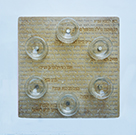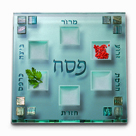Passover
- Page 1 of 1-
 Granite Porcelain Seder Plate with aluminum metal trays
$318.00
Granite Porcelain Seder Plate with aluminum metal trays
$318.00 -
 Granite Porcelain Seder Plate with brass metal trays
$318.00
Granite Porcelain Seder Plate with brass metal trays
$318.00 -
 Granite Porcelain Seder Plate with copper metal trays
$318.00
Granite Porcelain Seder Plate with copper metal trays
$318.00 -
 Granite Porcelain Seder Plate with multicolor metal trays
$318.00
Granite Porcelain Seder Plate with multicolor metal trays
$318.00 -
 Desert stone Seder Plate
$395.00
Desert stone Seder Plate
$395.00 -
 Illuminated jerusalem Stone Seder Plate with pyrex dishes
$385.00
Illuminated jerusalem Stone Seder Plate with pyrex dishes
$385.00 -
 Matzah Tray
$347.00
Matzah Tray
$347.00 -
 Illuminated Seder Plate
$345.00
Illuminated Seder Plate
$345.00 -
 Glass Seder Plate
$385.00
Glass Seder Plate
$385.00
Passover is probably the best known of the Jewish holidays, mostly because it ties in with Christian history (the Last Supper was apparently a Passover seder), and because a lot of its observances have been reinterpreted by Christians as Messianic and signs of Jesus.
Passover begins on the 15th day of the Jewish month of Nissan. It is the first of the three major festivals with both historical and agricultural significance (the other two are Shavuot and Sukkot. Agriculturally, it represents the beginning of the harvest season in Israel, but little attention is paid to this aspect of the holiday. The primary observances of Passover are related to the Exodus from Egypt after 400 years of slavery. This story is told in Exodus, Ch. 1-15. Many of the Passover observances are instituted in Chs. 12-15.
The name "Passover" refers to the fact that G-d "passed over" the houses of the Jews when he was slaying the firstborn of Egypt. In Hebrew, it is known as Pesach (that "ch" is pronounced as in the Scottish "loch"), which is based on the Hebrew root meaning "pass over". The holiday is also referred to as Chag he-Aviv (the Spring Festival), Chag ha-Matzoth (the Festival of Matzahs), and Zeman Herutenu (the Time of Our Freedom) (again, all with those Scottish "ch"s).
Probably the most significant observance related to Passover involves the removal of chametz (leaven; sounds like "hum it's" with that Scottish ch) from our homes. This commemorates the fact that the Jews leaving Egypt were in a hurry, and did not have time to let their bread rise. It is also a symbolic way of removing the "puffiness" (arrogance, pride) from our souls.
Source: The Jewish Virtual Library



 Wine Bottle Stand
$150.00
Wine Bottle Stand
$150.00